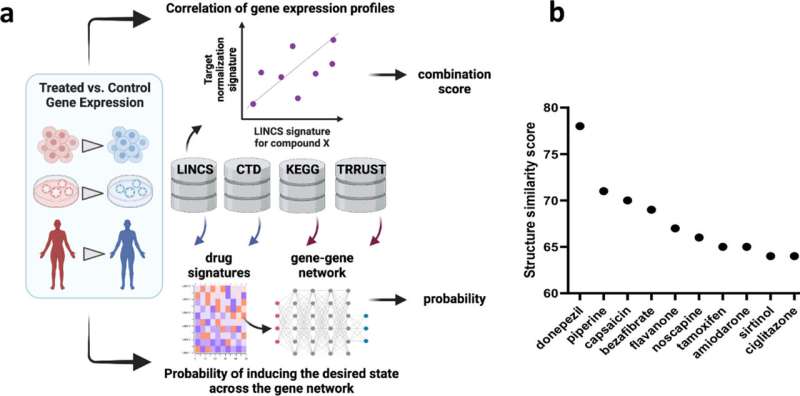This article has been reviewed according to Science X's editorial process and policies. Editors have highlighted the following attributes while ensuring the content's credibility:
fact-checked
peer-reviewed publication
trusted source
proofread
Alzheimer's drug may someday help save lives by inducing a state of 'suspended animation'

Researchers at the Wyss Institute for Biologically Inspired Engineering at Harvard University report that they were able to successfully put tadpoles of Xenopus laevis frogs into a hibernation-like torpor state using donepezil (DNP), a drug approved by the FDA to treat Alzheimer's.
The team had previously used another drug, SNC80, to achieve similar results in tadpoles and enhance the survival of whole mammalian hearts for transplants, but SNC80 is not approved for clinical use in humans because it can cause seizures. By contrast, DNP is already being used in the clinic, meaning it potentially could be rapidly repurposed for use in emergency situations to prevent irreversible organ injury while a person is being transported to a hospital.
"Cooling a patient's body down to slow its metabolic processes has long been used in medical settings to reduce injuries and long-term problems from severe conditions, but it can only currently be done in a well-resourced hospital," said co-author Michael Super, Ph.D., Director of Immuno-Materials at the Wyss Institute. "Achieving a similar state of 'biostasis' with an easily administered drug like DNP could potentially save millions of lives every year."
This research, published today in ACS Nano, was supported as part of the DARPA Biostasis Program, which funds projects that aim to extend the time for lifesaving medical treatment, often referred to as "the Golden Hour," following traumatic injury or acute infection. The Wyss Institute has been a participant in the Biostasis Program since 2018, and has achieved several important milestones over the last few years.
Using a combination of predictive machine learning algorithms and animal models, the Wyss' Biostasis team previously identified and tested existing drug compounds that had the potential to put living tissues into a state of suspended animation. Their first successful candidate, SNC80, significantly reduced oxygen consumption (a proxy for metabolism) in both a beating pig heart and in human organ chips, but has a known side effect of causing seizures when injected systemically.
In the new study, they once again turned to their algorithm, NeMoCad, to identify other compounds whose structures are similar to SNC80. Their top candidate was DNP, which has been approved since 1996 to treat Alzheimer's.
"Interestingly, clinical overdoses of DNP in patients suffering from Alzheimer's disease have been associated with drowsiness and a reduced heart rate—symptoms that are torpor-like. However, this is the first study, to our knowledge, that focuses on leveraging those effects as the main clinical response, and not as side effects," said the study's first author María Plaza Oliver, Ph.D., who was a Postdoctoral Fellow at the Wyss Institute when the work was conducted.
The team used X. laevis tadpoles to evaluate DNP's effects on a whole living organism, and found that it did successfully induce a torpor-like state that could be reversed when the drug was removed. The drug, however, did seem to cause some toxicity, and accumulated in all of the animals' tissues.
To solve that problem, the researchers encapsulated DNP inside lipid nanocarriers, and found that this both reduced toxicity and caused the drug to accumulate in the animals' brain tissue. This is a promising result, as the central nervous system is known to mediate hibernation and torpor in other animals as well.
Although DNP has been shown to protect neurons from metabolic stress in models of Alzheimer's disease, the team cautions that more work is needed to understand exactly how it torpor, as well as scale up production of the encapsulated DNP for use in larger animals and, potentially, humans.
"Donepezil has been used worldwide by patients for decades, so its properties and manufacturing methods are well-established. Lipid nanocarriers similar to the ones we used are also now approved for clinical use in other applications.
"This study demonstrates that an encapsulated version of the drug could potentially be used in the future to buy patients critical time to survive devastating injuries and diseases, and it could be easily formulated and produced at scale on a much shorter time scale than a new drug," said senior author Donald Ingber.
Additional authors of the paper include former Wyss members Erica Gardner, Takako Takeda, Shruti Kaushal, Vaskar Gnyawali, and Richard Novak; current Wyss members Tiffany Lin, Katherine Sheehan, Megan Sperry, Shanda Lightbown, Ramsés Martínez, Daniela del Campo, Haleh Fotowat, Michael Lewandowski, and Alexander Pauer; and Maria V. Lozano and Manuel J. Santander Ortega from the University of Castilla-La Mancha, Spain.
More information: Maria Plaza Oliver et al, Donepezil Nanoemulsion Induces a Torpor-like State with Reduced Toxicity in Nonhibernating Xenopus laevis Tadpoles, ACS Nano (2024). DOI: 10.1021/acsnano.4c02012.
Journal information: ACS Nano
Provided by Harvard University





















